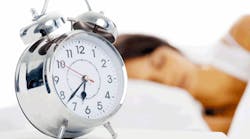The National Sleep Foundation (NSF) released its first international poll, comparing sleep times, attitudes, habits and bedtime routines of people in six countries.
While the title, “The 2013 International Bedroom Poll,” might sound racy, it’s not. The poll compares sleep times, attitudes, habits and bedtime routines of those in the United States, Canada, Mexico, the United Kingdom, Germany and Japan between the ages of 25 and 55 years old.
Japan and the United States report the least amount of sleep. Japanese and Americans report sleeping about 30 to 40 minutes less on work days than those in the other countries surveyed, averaging 6 hours and 22 minutes and 6 hours and 31 minutes of sleep, respectively. Two-thirds of Japanese say they sleep less than 7 hours on work nights, compared to 53 percent of Americans, 39 percent in the United Kingdom, 36 percent of Germans, 30 percent of Canadians and 29 percent of Mexicans.
Most people said they sleep better in a bedroom that smells good, not surprising, said researchers. “Studies have shown that scent plays a powerful role in relaxation and memory-building,” says David Cloud, National Sleep Foundation CEO. “Having a pleasant scent and a relaxing bedroom routine can contribute to a good night’s sleep. No matter what your nationality, you will spend about a third of your life in bed. Fresh air and a pleasant scent are great ways to improve your sleep experience.”
One in five from the United States, Japan and the United Kingdom report sleeping less than 6 hours a night during the work week, about twice the rate of the other countries (11 percent in Mexico, 10 percent in Germany and 7 percent in Canada).
Perhaps to compensate for less sleep, about one-half (51 percent) of both Japanese and Americans have taken at least one nap in the past two weeks. Every country reported sleeping in on weekends, with an average of an extra 45 minutes of sleep on days they do not work.
“Although we know that everyone sleeps, the rather remarkable cultural differences within this universal experience have not been adequately explored. It is NSF's hope that this initial poll will inspire more research on this critical yet understudied topic,” commented Namni Goel, Ph.D., research associate professor of Psychology in Psychiatry at the University of Pennsylvania Perelman School of Medicine and a member of the NSF 2013 International Bedroom Poll expert panel.
Less than one-half of people in most countries are sleeping well every night. Less than one-half of people in Mexico, the United States, Canada, the United Kingdom and Germany, and slightly more than one-half in Japan (54 percent) say they get a good night's sleep every night or almost every night on work nights or week nights.
One-fourth of those in the United Kingdom, the United States and Canada say they rarely or never get a good night's sleep during the work week. Notably, one in ten in the United Kingdom say they never get a good night’s sleep on work nights, twice the percentage of the other countries surveyed.
Despite slightly higher reported sleep satisfaction, almost one-third of Japanese (twice the rate of all other countries surveyed,) say they rarely or never woke up when they needed to during the work week, suggesting more sleep is desired.
“It is important to look at cultural differences in sleep, and not always to assume a U.S. focus,” says Jan Born, Ph.D., professor of Behavioral Neuroscience at the University of Tubingen, Germany, and a member of the NSF 2013 International Bedroom Poll expert panel. “Sleep is deeply inter-connected with health and performance, but it is often overlooked by researchers. This poll shows intriguing cultural variations on how we tackle this nightly, biological ritual.”
Preparing for Bed
More than one-half of Mexicans meditate or pray before bed; one-third of people in the United Kingdom sleep naked. The poll found some intriguing cultural differences in the bedtime rituals and habits of the six countries. For example, more than one-half of Mexicans (62 percent) and nearly half of Americans (47 percent) meditate or pray in the hour before sleep.
Forty percent of those in the United Kingdom drink a soothing beverage such as tea before bed and almost one-third of the country reported sleeping naked.
Perhaps the most common bedtime experience is television. At least two-thirds of people in all countries surveyed watch television in the hour before bed.
“This groundbreaking poll suggests that chronic sleep deprivation is a significant global health problem,” says Russell Rosenberg, Ph.D., director of Research and Investigator at NeuroTrials Research, NSF immediate past chairman and member of the NSF 2013 International Bedroom Poll expert panel. “Relax, turn off the mobile phone and TV, and create a more pleasant bed time routine. Setting the stage for good sleep can change your life.”
National Sleep Foundation Healthy Sleep Advice
To improve your sleep, try the following sleep tips:
- Exercise regularly. Vigorous exercise is best, but even light exercise is better than no activity. Exercise at any time of day, but not at the expense of your sleep.
- Go to sleep and wake at the same time every day, and avoid spending more time in bed than needed.
- Use your bedroom only for sleep to strengthen the association between your bed and sleep. It may help to remove work materials, computers and televisions from your bedroom.
- Save your worries for the daytime. If concerns come to mind, write them in a “worry book” so you can address those issues the next day.
- If you cannot sleep, go into another room and do something relaxing until you feel tired.
- If you are experiencing excessive daytime sleepiness, snoring, or “stop breathing” episodes in your sleep, contact your health care professional for a sleep apnea screening.

